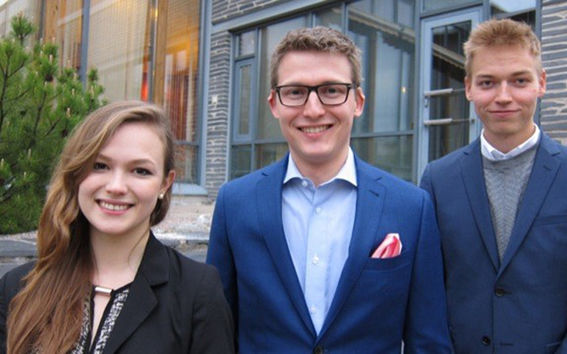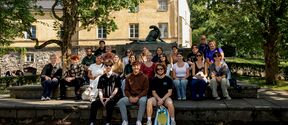The School of Business team won the People´s Choice award in the Economist case competition

Warwick Business School´s team won the 1st prize of the competition, The School of Economics and Management, University of Porto team was the 2nd best and the 3rd prize went to the team of The Sprott School of Business from Carleton University. Kerrisdale Capital Management´s Chief Investment Officer Sahm Adrangi with his colleagues at Kerrisdale picked the three winners.*
Additionally, there was a People’s Choice prize which was awarded to our School of Business students. The team members were Carolina Kansikas, Antti Niemi ja Oskari Färdig whose team received the most votes from visitors to The Economist website.
Teams were competing for $26,000 in prize money:
First place team received $15,000
Second place received $5,000
Third place received $3,000, and
People’s Choice received $3,000
– We enjoyed very much the competition and we learnt a lot. Especially getting the prize crowned everything and gave a positive feeling about the competition, tells Oskari Färdig.
Each team had to produce a thorough report as well as a 15-minute video explaining their analysis to be posted to The Economist’s Which MBA? website.
The challenge was titled: "Find a Zero: Which Billion Dollar Company Will be Bankrupt by 2020". The solution summary of the School of Business team was as follows: The solar industry is one of the most promising industries of the future, but great profitability entails ruthless competition. Wrong positioning in the market, lack of technological competitive edge, a fad business model, lack of value added to customers, and financial weakness will lead SolarCity Corp. (SCTY) to succumb its competitors and file for bankruptcy by 2020. We go to show the flaws inherent in SolarCity’s long-term prospects, financial stability and current market capitalization. The key to the company’s misery in the following five years will be superior services offered by competitors such as SunEdison (SUNE) operating in utility-scale solar power. SolarCity is fully dependent on obtaining credit from the market to be able to maintain profitable growth. We believe that the inflow of money will effectively shut down after the weakness of its operations becomes clear. The same holds true for SolarCity’s current market capitalization, which is based on unrealistic fundamentals. Our thorough analysis will evaluate each of these claims in full detail.
*The case competition challenge and resulting selection of winners are based solely on the opinion of the challenge sponsor. The Economist does not endorse the opinions contained in the content of the challenge or the participants’ written and video submissions.
Kerrisdale Capital is known for publishing high quality reports on misunderstood and overhyped companies in an effort to correct market misconceptions.
Further information: www.economist.com/case
Read more news
Growing Materials, Growing Ideas: Inside the Biomaker Studio
At Aalto University’s Biomaker Studio, initiated by Ena Naito, students and researchers experiment with living materials, from algae to mycelium, creating an open, interdisciplinary space where design, biology, and collaboration grow together.
The year in Review: What happened in 2025?
A recap of the milestones of the Master in Contemporary Design in 2025
“This hands-on approach is the absolute best way to learn” – Loyola University and Aalto University partnered for the sixth time
Isabel Towghi shares her experience from Aalto University Summer School.






